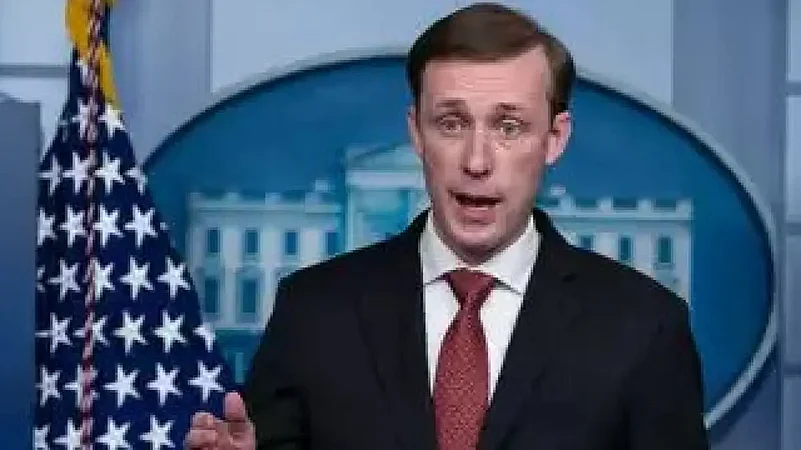The White House on Thursday said it is engaged in close consultations with Canada over allegations of Indian involvement in the killing of a Sikh terrorist on Canadian soil and denied the presence of any wedge between the two countries.
Canadian Prime Minister Justin Trudeau on Monday said that India could be behind the killing of Hardeep Singh Nijjar, who was killed in the Surrey city of Canada in June. Nijjar was a designated terrorist who was the chief of Khalistan Tiger Force (KTF), also a designated terrorist organisation.
Speaking in the Parliament, Trudeau said that his government was pursuing "credible allegations of a potential link between agents of the government of India" in Nijjar's killing. Following the statement, Canada expelled a top Indian diplomat from Canada and outed him as an Indian intelligence official. India has since forcefully rejected Trudeau's allegations and has expelled a Canadian diplomat from New Delhi who is understood be a Canadian intelligence official.
As reports surfaced that Canada had sought support from allies like the United States in the matter but was snubbed, the White House has said there is no wedge between the two countries and that the United States is "deeply concerned" regarding the allegations.
"As soon as we heard from the Canadian Prime Minister publicly about the allegations, we went out publicly ourselves and expressed our deep concern about them, our support for a law enforcement process to get to the bottom of exactly what happened and to ensure that the perpetrators are held accountable....We are consulting with them closely, we support the efforts that they are undertaking in this investigation, and we have also been in touch with the Indian government as well," said US National Security Advisor Jake Sullivan.
Trudeau plunged the India-Canada relations to a new low with his allegations, which had already been very strained for the past few years over the safe haven that the Khalistan terrorists and the broader secessionist movement has found in Canada. Reacting forcefully to the Canadian offensive, the Indian government suspended visa services for Canadian nationals and further asked the Canadian government to downsize its mission's size in India.
In a statement on Thursday, the Ministry of External Affairs termed Canada a "safe haven" for terrorism. The tensions in the India-Canada relationship were already at display at the G20 Summit when Trudeau was snubbed by India and Prime Minister Narendra Modi and he had a curt meeting. In the chilling readout of the meeting, India said that Modi "conveyed our strong concerns about continuing anti-India activities of extremist elements in Canada".
"They are promoting secessionism and inciting violence against Indian diplomats, damaging diplomatic premises, and threatening the Indian community in Canada and their places of worship. The nexus of such forces with organized crime, drug syndicates and human trafficking should be a concern for Canada as well. It is essential for the two countries to cooperate in dealing with such threats," said the readout further.
Responding to a question at a press briefing about Biden's position on Trudeau's allegations and whether he intends to speak with Modi on the issue, Sullivan said that he would not comment on the private diplomatic conversations.
As for reports that Canada had sought support from allies like the United States but was rebuffed in the matter, Sullivan "firmly rejected" such reports.
"And I will leave it at that for today, only to say that I have seen in the press some efforts to try to drive a wedge between the United States and Canada on this issue. And I firmly reject the idea that there is a wedge between the U.S. and Canada. We have deep concerns about the allegations, and we would like to see this investigation carried forward and the perpetrators held to account," said Sullivan.
Amid reports that a 'Five Eyes' ally had also provided intelligence to the Canada related to Nijjar's killing, Sullivan said he would not speak on either intelligence or law enforcement matters.
Sullivan also said that there is "no exemption" for India and the United States takes such cases seriously "regardless of the country".
"It is a matter of concern for us. It is something we take seriously. It’s something we will keep working on, and we will do that regardless of the country. There is not some special exemption you get for actions like this. Regardless of the country, we will stand up and defend our basic principles. And we will also consult closely with allies like Canada as they pursue their law enforcement and diplomatic process," said Sullivan.
For years, India-Canada ties have been strained over inaction on the Khalistani elements in Canada engaged in anti-India activities. The Khalistan movement seeks a separate state to be carved out of India for Sikhs called Khalistan. For decades, the movement waged a bloody insurgency in India. While the insurgency ebbed in India in 1990s, it continues to have a strong presence in pockets abroad, such as in Canada and the United Kingdom. In Canada, the Khalistani elements have threatened Indian mission and diplomats and have vandalised Hindu temples and targeted the Indian community there. Trudeau and his allies have been accused for years for being supportive of such Khalistani elements.

















